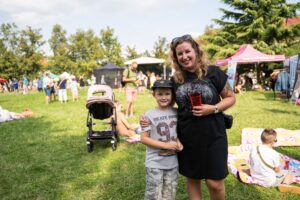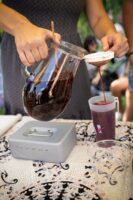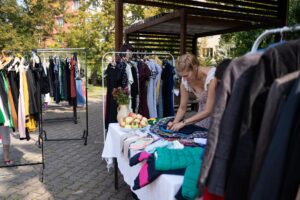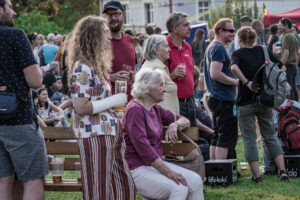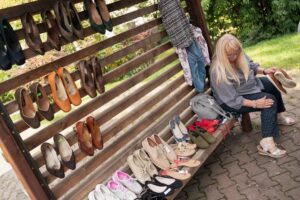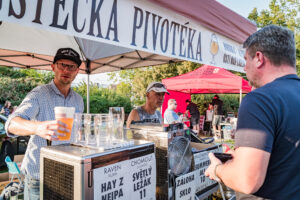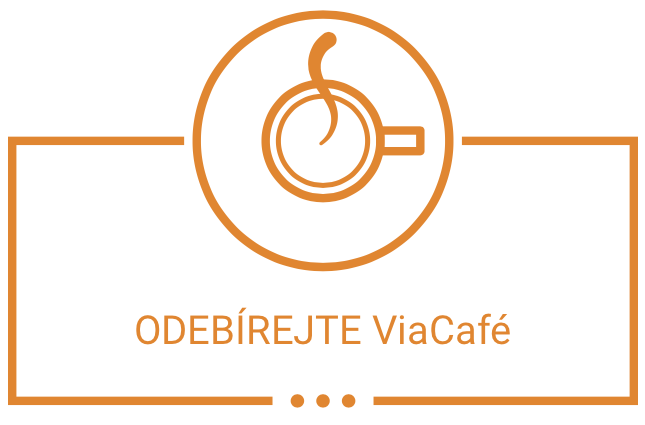At Via Foundation, environmental sustainability is important to us. We support of tree planting, pond development and other landscape projects – but we consider the environment in other contexts, too. We believe that it is wise to think about environmental aspects even in situations that don’t seem to be linked to environmental issues at first glance. Like holding neighborhood events. We spoke with one of our many smart, engaged grantees to ask how she incorporates environmental concerns into the community events she holds.
Míša Valášková is part of a group called Mongooses (Promyky). In recent years, she and two of her neighbors have been like a spark, initiating cultural life in their district of the city of Ústí nad Labem. They have organized several events in a local park – a festival, an advent charity market, and a theatre performance for the broad public. Thanks to these events, residents are communicating more with one another, helping to organize events and becoming closer-knit neighbors. Míša and her team also try to raise event participants’ awareness about ways of living more sustainably and the importance of protecting the environment. She shared specific ways that she does that.
Míša, what specific things have you done to make your events more environmentally sustainable?
Ever since we began holding community events, we have asked participants to bring their own plates and beverage containers. We like to see food vendors with recyclable returnable packaging. It is also great if there one of the vendors is a non-packaging store which considers environmental protection the highest value in its business. Another traditional part of our event is a rummage sale of clothing and accessories, held alongside the event cultural programming. It combines inexpensive slow fashion*, a chance to exchange a few words with the original owner, the sun overhead and good music – and we find that many people definitely prefer this shopping experience to an anonymous shopping center with artificial lighting and hefty price tags.
How did the public respond?
We think that residents of our district, at least a considerable number of them, perceive how consumer behavior impacts our planet. Our festival invitation, for example, asks people to bring their own cup and we added a photo of what a festival site in Glastonbury looked the day after – that helped a lot of people realize how damaging single-use plastic can be. We don’t count the number of cups, glasses and mugs that people bring but it seems to be growing each year.
What changes have you had to make in comparison to earlier events where you didn’t put so much emphasis on environmental concerns?
This has always been part of how we do things, ever since our very first Christmas gathering. Elimination of single-use waste at an event for 300 to 600 people benefits for us as event organizers, too, because it means less clean up and fewer volunteers, gloves and trash bags needed. It’s great to realize that three to five people can keep a park clean for 12 hours and not to have to worry too much about the waste disposal side of things.
Have these measures affected your event budget?
Trying to make the event more environmentally sustainable doesn’t add to our budget – actually it’s the opposite. We don’t have to buy protective gear, loads of trash bags, order food for lots of volunteers, or arrange a vehicle and driver to dispose of the garbage. The day after the event clean-up the municipal waste services takes the garbage away. That means we have more money for other, more meaningful things – instead of throwing money away like garbage!
Will you continue to take this approach?
Actually, we’re going to increase our environmental emphasis. We are going to ensure that all of our vendors have returnable containers and reach an agreement with all vendors to stop using any single-use plastics. Event visitors who don’t bring their own cups will pay a deposit to use ours. If they like the event cup with our logo, they can take it home or give it back in exchange for their deposit.
Via Foundation supported the project “Together to develop the Klíše district” in 2020 through the Living Communities program.
…………………………….
*“Slow fashion” is an approach adopted by fashion designers, manufacturers, retailers and consumers in which production and purchase of clothing is influenced by the realization of the impacts of clothing production or distribution on workers, society and ecosystems. The goal is to buy less clothing of higher quality that lasts longer (and may be reused to serve multiple people).

